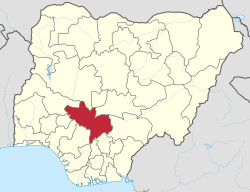INTRODUCTION
Kogi State is one of the six states that make up Nigeria’s North-Central geopolitical zone along with the Federal Capital Territory (FCT). It has interstate boundaries with Nasarawa States and the FCT to the North, Benue State to the East, Enugu, Anambra, Edo and Ondo States to the South and Ekiti and Kwara States to the West. The state capital is Lokoja.
LANDMASS, LOCATION AND POPULATION
Kogi State covers an area of 29,834 square kilometres and lies at latitude 7°30’ North and longitude 6°42’ East. It has a population of 3,314,043 (2006 census) 4,473,490 (2016 forecast) and a population density of 111. The state accounts for 2.4% of the total population of Nigeria.
HISTORY AND PEOPLE
The early settlers of Kogi State included the Ebira and Igala people, who are the dominant ethnic groups in the state. Kogi State was originally part of the Northern Region in the three-region structure of 1954. With the creation of twelve federal states by General Yakubu Gowon’s military government in 1967, it became part of the West Central State. When the military government of General Murtala Muhammed created nineteen states out of the existing twelve in 1976, West Central State was renamed Kwara State. In 1991, the military government of General Ibrahim Babangida carved out Kogi State from parts of Kwara and Benue States.
During the colonial days, Lokoja was the administrative capital of Nigeria and it was there that the name ‘Nigeria’ was coined by Flora Shaw. The main ethnic groups in Kogi State are the Igala, Ebira and Okun. Its minority ethnic groups include the Bassa, Ogori-Magongo, Ebura-Koto, Oworo, Kakanda and Hausa.
Many languages are spoken in the state, of which Ebira, Igala, Nupe and Yoruba are the main ones. Christianity and Islam are the main religions in Kogi State, although traditional religion is practised there.
MAIN TOWNS AND CITIES
Lokoja (capital), Ankpa, Ayingba, Dekina, Idah, Kabba, Koton-Karfe and Okene.
LOCAL GOVERNMENT AREAS
ADMINISTRATORS AND GOVERNORS
Danladi Zakari (Governor – Military): August 1991 – January 1992
Abubakar Audu (Governor – Civilian (National Republican Convention)): January 1992 – November 1993
Paul Omeruo (Administrator – Military): December 1993 – August 1996
Bzigu Afakirya (Administrator – Military): August 1996 – August 1998
Augustine Aniebo (Administrator – Military): August 1998 – May 1999
Abubakar Audu (Governor – Civilian (All People’s Party/; All Nigeria People’s Party)): May 1999 – May 2003
Ibrahim Idris (Governor – Civilian (People’s Democratic Party)): May 2003 – February 2008
Clarence Olafemi (Acting Governor – Civilian (People’s Democratic Party)): February 2008 – March 2008
Ibrahim Idris (Governor – Civilian (People’s Democratic Party)): March 2008 – January 2012
Idris Wada (Governor – Civilian (People’s Democratic Party)): January 2012 –January 2016
Yahaya Bello (Governor – Civilian (All Progressives Congress): January 2016 - Present
ECONOMY AND EDUCATION
Kogi State is mostly forest savannah with some areas of woodland savannah. Agriculture is very important and a significant percentage of the state’s workers are engaged in it. Coffee, cocoa, oil palm, cashew and groundnut are the state’s main cash crops while corn, cassava, yam, rice and melon are cultivated for domestic consumption. Fishing in inland waterways and animal husbandry are other significant commercial activities.
Natural resources found in Kogi State include iron ore, coal, marble, feldspar, limestone, kaolin, talc, mica, phosphate, columbite and granite, while its industries include cement manufacturing, iron and steel.
The tertiary institutions in the state are Kogi State University, Anyigba; Salem University, Lokoja; Federal Polytechnic, Idah; Kogi State Polytechnic, Lokoja and the College of Agriculture, Kabba.
FAMOUS SITES AND CULTURE
Sites
Confluence of Rivers Niger and Benue, Lokoja
Kogi State is called the Confluence State because of the meeting point of Rivers Niger and Benue at Lokoja. A Y-shape is formed where the two rivers meet before flowing southwards into the Atlantic Ocean.
The rivers retain their unique colous - light green for River Benue and brown for River Niger right up to emptying into the ocean.
Cenotaph, Lokoja
The Ccenotaph in Lokoja was built in memory of soldiers who died during the First and Second World Wars. On display at the Cenotaph are weapons used during the two wars as well as the inscribed names of fallen war heroes.
It is where the annual Armed Forces Remembrance Day celebration in the state usually takes place.
Iron of Liberty, Lokoja
The Iron of Liberty in Lokoja marks where slaves were set free by British anti-slavery campaigners in 1860. Lokoja was a prominent slave trade centre because of its proximity to River Niger. Bishop Ajayi Crowther, the first African Anglican bishop is buried there.
Culture
An important festival in Ebiraland is the annual Ekuechi festival, which marks end of the lunar year.
The Italo festival which features traditional music and dance is celebrated annually by the Igala people.
Other major events in the state include the Egbe, Oganyiganyi, Ovia-Osese and Ogani festivals.
NOTABLE INDIGENES
Chief S.A. Ajayi (1910 – 1994)
Tolulope Arotile (1995 – 2020)
DID YOU KNOW
Holy Trinity Primary School in Lokoja is the oldest primary school in Northern Nigeria. It was founded in 1865.
KOGI STATE IN PICTURES

